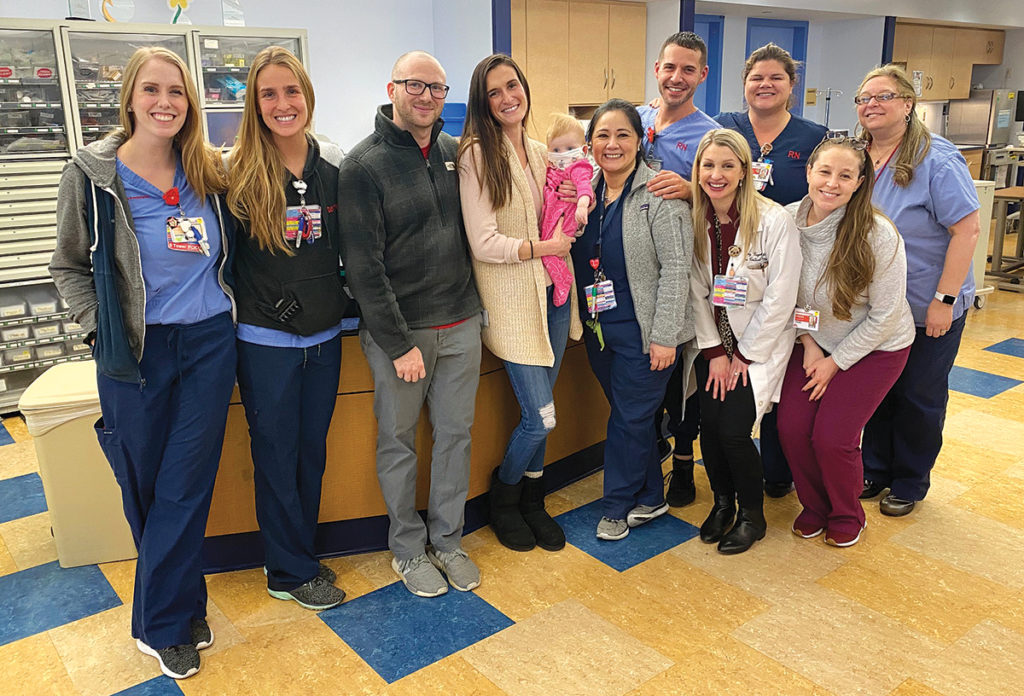A new heart for Ruby who returns home after 126-day journey

The 7-month-old Wading River girl who experienced heart failure four months ago and had been surviving on a so-called Berlin heart ever since received a successful transplant three days before Christmas.
Ruby June Cotter’s parents, Ashley and Brian, learned the morning of Dec. 22 that doctors believed they’d found a viable heart for their little girl, who suffers from dilated cardiomyopathy. According to the American Heart Association, the condition affects the heart’s ventricles and atria, stretching and thinning the left ventricle, the heart’s main pumping chamber.
Ruby experienced heart failure Sept. 4. She woke up pale and unwell and her parents thought she had a virus, but noted that her limbs were cold while the rest of her body was hot. Ruby wasn’t eating, she was dry heaving and her face quickly turned blue. So began the Cotters’ 126-day journey at New York-Presbyterian Hospital.
“When we found out about the heart that was available for her,” Mr. Cotter said, “me and my wife were just sitting there putting a puzzle together. It was about 6:30 at night and when one of the doctors came in from the heart failure team, we knew what was going on.”
Ms. Cotter said she and her husband were in disbelief at the news.
“I think we were getting to the point where it felt like the heart was never going to come and we were just going to be perpetually living in the hospital forever,” she said.
A number of pre-operative measures were necessary, starting with a doctor observing the donor heart the next morning, to ensure its viability. Seconds turned to minutes and minutes to hours as the Cotters awaited word.
“We didn’t actually find out until noon or so, maybe 1, that they did accept the heart,” said Ms. Cotter. “We were hopeful, you know? I mean, I guess because we were in such disbelief, we weren’t excited or anxious or anticipating it. … It hadn’t really hit us.”
Ruby’s surgery was a success and she left the operating room stable. She was still intubated and sedated but, Mr. Cotter said, her numbers read well.
“All her numbers on the monitor, her blood pressure, her heartbeat … they were real numbers. They were actual, real and healthy numbers. We were in shock,” he said.
There’s a sense of comfort that you can tell just when you’re holding her.
Brian Cotter
For over three months, Ruby had been living on a Berlin heart, a ventricular assist device that monitors and maintains blood flow in children with serious heart failure. On Dec. 22, that device was removed and Ruby’s new heart was transplanted.
The Cotters do not know the source of the heart, but they do plan on writing the donor family a letter, which will be delivered by a third-party intermediary donor organization a year from the date of operation.

Ruby is now home and healthy, unhooked from almost all of the machines her life previously depended on. She will continue to rely on a nasogastric tube until she is able to consume some food on her own.
“She’ll always be immunosuppressed,” Ms. Cotter said, “and that’s why it’s really critical on our end and just for general public health for her to be conscious of what’s going around, if anyone’s sick in the vicinity. … It’s lifelong.”
As of right now, doctors are thrilled with Ruby’s progress, according to Ms. Cotter. Down the road, she may need another heart, but when is anyone’s guess. Doctors will continue monitoring her health over the years and should know well in advance if her new heart begins deteriorating.
“It’s scary, you know, overall, it’s scary because our 6-month-old was undergoing surgery,” said Mr. Cotter. Along with the many associated risks, the Cotters felt sadness for the donor family, who had to have lost a child in order for young Ruby to have gained the chance to grow up healthy.
But coming home with their daughter, he said, was incredible.
“It kind of feels like when we brought her home the first time after she was born,” he said.
The Cotters acknowledged the challenge of adjusting to new medications, pumping devices and at-home care without the assistance of hospital staff. Still, they view being home with their daughter and having her stable as a great gift.
“We really spent four months standing around a crib,” Mr. Cotter said. “She’s relaxed; we can see it in her, since we got home. … There’s a sense of comfort that you can tell just when you’re holding her. Just being able to give her a bath, being able to put her in a car seat and drive somewhere, being able to just walk around, holding her while drinking a cup of coffee … everything has new meaning.”



